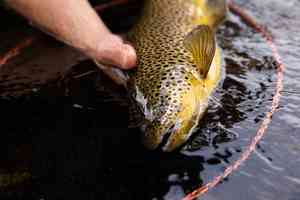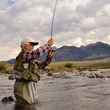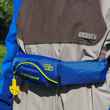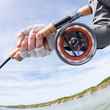"You look like you got ran over by a truck," my son says.
"Mom's a rookie."
My husband is right. When it comes to rowing, I'm a rookie. The black grease smeared across the front of my orange fleece is evidence of that. I tried hooking our drift boat to my truck on my own. I'm not proud of my performance in the driveway. The dirty shirt is my now my scarlet letter and I have to wear it while I learn to row.
I embarked on my summer of rowing lessons shortly after one of my dirt runs in the mountains. My mind trotted along with my feet, rambling on about how I spend six months running 700 miles in preparation for a 60-mile trail race, but I don't train for time on the oars then wonder why I fear every rock rather than no rock. Makes no sense.
"That's it!" I said. I want to feel as comfortable in the rower's seat as I do on the trail. That comfort level takes practice and training. It also takes bruising, cussing and skills you must master before you grip an oar.
In the driveway
More Like This
Hitching a drift boat trailer is easier than hitching a camp trailer because boat trailers are smaller. If you're not lined up just right, you can always wheel the boat trailer by hand and line it up perfectly with the connection point on the back of your truck. But, like all hitches, boat trailer hitches wear grease. A lot of grease. Never grab the grease. You'll sport the black mark for the rest of the summer.
At the ramp
The bulk of a camp trailer makes hitching harder, but backing it up is easier. Big trailers follow the back-up lead of a truck smoother than small drift boat trailers. Those are squirrelly. They fishtail every which way but straight in reverse.
Avoid this game of chase in front a crowd by practicing in an empty parking lot. My truck, my trailer and I spent every day but Sunday at the church down the street for a week. Newly striped, yellow lines on dark asphalt are a godsend for helping you see the world through rearview mirrors.
You won't have that on a boat ramp. Just a lot of watchers wearing that face. The face that says, "Look at her trying to back that up. This ought to be fun to watch."
I hate that face. I want to stomp my park break right there on the ramp and get out and punch that smug face. Instead I just put my boat in on first try then peel out so they're dusted.
In the seat
Truck's parked. Get in the boat. Have whoever is teaching you to captain your vessel row away from the ramp. That way you're not clogging the ramp and you're getting out of gawk range for adjustments with the anchor dropped.
The first adjustment is seat, which is usually attached to a middle bench that slides. It's similar to how the seat in your car adjusts forward and back. The bench in my boat was set for my husband's long legs until I started rowing. While it is a simple pull the peg adjustment, we don't like to do it every time we switch rowers so it's always set for my shorter stance and my husband rows with his knees around his ears.
On the oars
Oars. These will knock you out of the boat if you let them. Don't let them. The farther they are from your body, the heavier they feel so don't make yourself reach for them.
Oar rings, when rubbing oar locks, determine how much oar is in the boat. Adjust the ring until your hands while on oar grips are hovering over your knees. Feel any nubs on the end of the grip with your thumb? Keep those vertical with your thumb between them. That's how you know, by feel, that your oars are in the water at the right angle.
While hovering, test the distance between your face and your feet. Make sure you aren't hitting chin when oars go deep in current or thigh when oars come out of the water. Both bumps make for a long day when done in repetition.
I also like wearing gloves with traction. Even when it's hot. Cuts down on calluses and helps me handle equipment that is bigger, and heavier, than me.
Sticks to Stones
Your sticks will hit stones. So will your boat. Especially when you're learning. Don't panic and don't give up the oars mid-crisis. No one else in the boat can get in the rower's seat faster than you already being in it. Quickly figure out the problem with guidance from others in the boat, but don't expect them to bail you out too late in the game. If upcoming water looks uncomfortable, switch rowers well ahead of discomfort.
And always remember the water is bigger than you no matter the size of your ego or your experience level. The flow is boss and I have the ding on my boat to prove it. It's an ugly ding and it happened the second I said out loud, "I've got this."

Clearly, I didn't have it and the river told me so. The boat bounced boulder hard enough to sound like a car wreck and the bruise on my shin from getting pinned between bench and oar looked just as bad. I considered repainting my boat to remove all evidence of the ding and my rookie ways, but now I like it. Reminds me how far I've come.
And I know I've come far because I'm on a boat ramp crowded with inner tubers and I haven't hit any of them. One tuber, in a white beater tank with black rubber around his waist, thinks he's helping me with his arms waving all about. My son, watching well out of tail light traffic, knows such a scene would have sent me home rowless a few months ago, but not today. I'm not backing out. I'm backing in. Boat hits water on first try. I hit the gas and get off the ramp.
"That guy thought he was helping you," my son says.
"Yep."
"We're you even looking at him?"
"Nope."
"I knew it."
I hand him the net, my husband picks up his rod and I take the rower's seat.































Comments